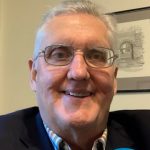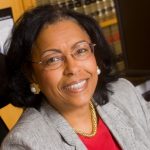-
Barry Roth, L'74
Working with Fellow Graduates
I was a member of the first class in 1974 which only attended at the new law school building,the construction of which was incomplete when we started in 1974. After graduating, I served as a lawyer in the White House Counsel’s Office, and among my duties was dealing with the Nixon Presidential papers that were left at the White House after his resignation. One of my most interesting meetings was in Judge Sirica’s chambers (another GULC graduate) over issues surrounding access to those papers. Judge Sirica’s law clerk was Robert Ruyak who also graduated with me in 1974. It was quite a time with all of us GULC graduates discussing the related issues along with representatives from the Watergate Special Prosecutor.
-
Jose Uranga, L'72
A Student Recruiting Students
-
Joe Fink, L'73
5 Minutes with Sam Dash
-
Michael Karam, F'72, L'76, L'81
About Linda Morgan
-
Robert Wellen, L'75
LL.M Opens Eyes
I was a student in the LL.M Tax program during the early 1970s while on active duty in the Navy JAG Corps. I had taken a few tax courses in undergraduate law school.In fact, I was fortunate enough to have studied with giants like Boris Bittker (and served as his research assistant) and Marvin Chirelstein. But the LL.M program really opened my eyes on the realities and variety of tax practice.
Teachers like Earl Colson (gains and losses), John Sexton (partnerships), and Fred Peel (consolidated returns) gave us practical background as well as technical preparation.
Also, a lot of my fellow students were working for law and accounting firms and the IRS. Guys like Bill Zimbalist and Steve Mopsick showed me how much fun they were having with tax work.
But the biggest influence on me from the LL.M program was Peter Weidenbruch. He taught a tax policy seminar that went way beyond the usual technical details. We became good friends. After I left Navy JAG, Peter and I became colleagues in the then-tiny Washington office of Fulbright & Jaworski (now Norton Rose Fulbright). There, Peter taught me, millimeter-by millimeter, how to structure a corporate transaction, how to request AND GET a private letter ruling from the IRS, and how to advise clients.
When I took up adjunct professor tasks in the LL.M program, his tips included: “Don’t stand still. Move around. You need to keep people awake in a night class." And, "If a student asks a question, even if you know the answer, answer with a question of your own."
Best of luck in the next 150 years! -
Mazie Hirono, L'78
Victor Kramer Memories
-
Wally Mlyniec, L'70
A Signal Dean
-
 Michael Karam, F'72, L'76, L'81
Michael Karam, F'72, L'76, L'81Georgetown Law and Life
Congratulations to Georgetown Law on its 150th Anniversary Commemoration. Little did I know in August 1973 when I entered McDonough Hall, that I was beginning a now 48-year old journey that would enrich my life in so many ways.I met my late-wife and classmate, Linda J. Morgan (L’76), while at the Law Center, had the privilege of working for and developing a life-long friendship with the legendary tax professor Peter P. Weidenbruch as his research assistant, took courses from and developed friendships with Dean Paul R. Dean and Professor Frank J. Dugan. During my three years, I also discovered the world of tax law, which was to form the core of my public service career, first as an Attorney Advisor at the United States Tax Court and then for 28 ½ years as a Federal tax prosecutor with the Tax Division, United States Department of Justice. I could not have been more prepared for my career than from my education at Georgetown Law.
But my three years as a JD student were just a precursor to my post-graduate service and relationship with Georgetown Law. Working with my wife and classmate Linda, we immediately became engaged in alumni-related activities, hosting events for admitted students, and organizing and coordinating each of our five-year reunions. With each year and event, we broadened the scope of our Georgetown Law connections and friendships! I became involved with the Law Alumni Board in 1996 and continue to serve as an Emeritus member.
Following a most distinguished public service career, including serving as the General Counsel of the United States Senate Committee on Commerce, Science and Transportation from 1986 until 1993, and then as the last Chair of the Interstate Commerce Commission and the first Chair of its successor agency, the Surface Transportation Board, both Presidentially appointed and Senate confirmed positions, my wife Linda joined the Law Center’s Board of Visitors in 2004 after beginning her private law career at Covington and Burling in 2003. Linda served on the Board of Visitors until her untimely death from breast cancer in November 2015. Following Linda’s death, I succeeded her on the Law Board of Visitors and continue to actively serve on that Board. Throughout our alumni time together, Georgetown Law was a primary recipient of our time, talent, and treasure but it always gave us back so much more than what we contributed!
Finally, over the course of the modern era of Georgetown Law beginning with the ascendancy of Paul R. Dean to the Deanship in 1954, Georgetown has been blessed with a series of outstanding Deans as leaders. But there have been, in my view, three great deans, and I would like to personally acknowledge and thank them for their service and friendship! The three great deans are Paul R. Dean (1954-69), Judith R. Areen (1989-2004 and 2010), and William Treanor (2010-present). Thank you all, and congratulations to Georgetown Law on its 150th Anniversary!
Law is but the means; justice is the end! -
 Judge Cheryl Long, L'74
Judge Cheryl Long, L'74Must-Have Courses
Just a few years ago, in a focus group with Dean Treanor, I learned that part of the Law Center’s long-term plan was to strengthen its brand as a Washington, D.C. law school.This meant highlighting the seemingly obvious advantage of being so close to all three branches of the central government. Among other things, it also meant continuing to attract real-life practitioners who are Adjunct Professors in the major specialties.
One of my prominent memories of being a student at GULC from 1971 to 1974 was discovering the adjuncts as hands-on lawyers who knew the candid side of legal issues. I have a firm recollection of my classmates being very hungry to learn how to use the law, not being content with the standard fare of the usual courses.
We appreciated tips from upperclassmen about adjuncts who taught the “must have” courses, for those who wanted to be litigators. We traded “best kept” secrets, as if landing a spot in one of those courses was a major coup for those “in the know.” The two most popular Adjuncts were Daniel A. Rezneck, Esq. (Federal Courts) and Martin S. Thaler, Esq. (Commercial Law).
Hopefully, today, taking courses taught by adjuncts is part of every student’s GULC experience. -
Judge Margaret McKeown, L'75, H'05
Truth in the Court